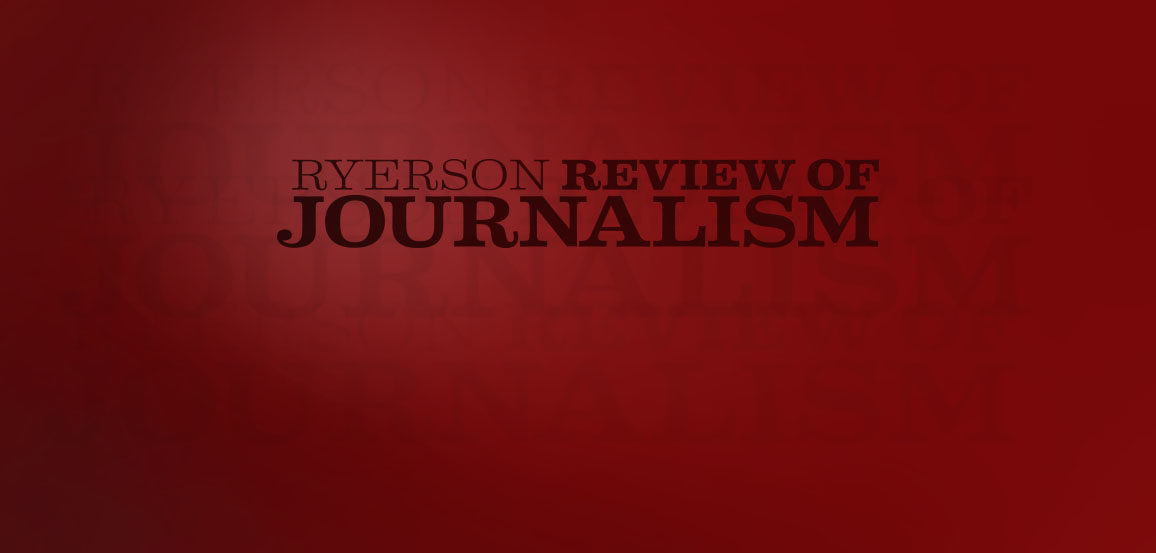In mid-November, Andrew Lundy, director of digital at The Canadian Press, sent an internal email to about 20 bureau chiefs, department heads and news editors asking them to come up with nominees for Newsmaker of the Year. A week later, he had a list of 18 candidates, including Rob Ford, senators, Chris Hadfield, Alice Munro, Rehtaeh Parsons, Theresa Spence, Justin Bieber and the IKEA monkey. In early December, CP’s editorial supervisors sent electronic ballots to about 300 people at the news service’s client newspapers, broadcast stations and online portals. On December 22, CP will announce this year’s choice.
The title is not meant to be an honour or popularity contest, just a measure of who was most newsworthy. As each voter has a different definition of that, CP’s editor-in-chief Scott White, who used to handle the responsibility, admits, “This is just a thing that’s been done since 1946. I don’t know what the value is. I think this is just something that people naturally want to do at the end of every year.” Still, some picks generate more attention than others—last year, for instance, CP awarded the title to Luka Magnotta, who made headlines after allegedly dismembering Concordia University student Lin Jun and mailing his body parts to political offices and elementary schools. But such controversy helps make the Newsmaker of the Year a good storytelling device.
Since the first Newsmaker, 70 percent of the selections have been politicians or diplomats (Lester Pearson nine times and Pierre Trudeau 11 times) while 16 percent have been athletes (including Rick Hansen and Terry Fox). Three have been criminals: Lucien Rivard, Russell Williams and Magnotta. Time started a similar annual tradition in 1927, when it named aviator Charles Lindbergh its Man of the Year. Time picked the Twenty-Five and Under generation in 1966, Endangered Earth in 1988 and You in 2006. Like CP, the magazine has also made stomach-churning choices—Adolf Hitler in 1938—for the title, which became Person of the Year in 1999. Earlier this month, Time generated controversy by selecting Pope Francis.
Paul Harvey, assistant managing editor of local news at the Calgary Herald, doesn’t think the Newsmaker “award” has much impact on journalism or readers. “How could it? It’s just a popularity contest of past events.” He admits there’s debate over the definition of a Newsmaker even among journalists, recalling newsroom discussions about it. “Are you voting for the guy who makes the most headlines or are you voting for the guy who is the most significant?” he asks. “Otherwise, you can just go to Infomart and count the number of times somebody’s name has been mentioned and the number of front-page headlines he or she gets.” Noel Hulsman, managing editor of finance at Yahoo Canada, agrees and thinks the criterion has not evolved over time. “It’s just somebody who garnered the most headlines, which could be for good reasons—or frequently, bad reasons.”
CP certainly generated controversy when it named Magnotta last year. Former minister of Canadian heritage and official languages James Moore tweeted: “’Newsmaker of the year’ ought not simply be the person with the most Google News hits due to morbid curiosity. Revisit the criteria #2cents.” Former interim Liberal leader Bob Rae expressed his outrage with: “Canadian Press reaches new low with its naming Magnotta ‘newsmaker of the year.’ Truly disgusting.” Jian Ghomeshi, host and co-creator of CBC Radio’s Q, followed with: “CP and others have given him the status he so craved.” Then, Conservative MP Jay Aspin joined the chorus: “I appeal to decency & better judgement of the Canadian Press and ask them to rescind their choice.”
Lucinda Chodan, editor-in-chief of Montreal’s The Gazette, wasn’t surprised by the social media reaction. She notes that when it comes to people who are recognizable across the country, politicians, athletes and criminals are the most obvious picks. “As proud as we are of Alice Munro as Canadians, it really was a one-week sensation,” she says, “whereas Luka Magnotta was in the headlines for weeks.”
But Harvey voted for runner-up Amanda Todd, the 15-year-old B.C. girl who committed suicide shortly after posting a video on YouTube about being bullied for years. He says quantity or longevity shouldn’t be the only criteria and a Newsmaker should also raise important issues, as Todd did: the government, school boards, the public and parents all paid attention. “I thought there was a bigger issue there instead of a guy who was just a crazy nut job—allegedly,” he says. “Maybe I’m breaking the rules by voting for who I did, but I’m not going to vote for a guy who is accused of being a cannibal. How is that guy a Newsmaker of the Year?”
Canadian regionalism presents another problem. Jim Poling, managing editor of The Hamilton Spectator, consults his newsroom staff before voting. He says that the votes might skew to where there are more publishing entities. Last year, 36 out of 110 voters were from Ontario, while only 10 were from Québec—where Magnotta didn’t receive a single vote. And Chodan points out that the majority of past Newsmakers hail from Ontario, which reflects the local scope of most news coverage outside of the province. On the Gazette’s website, for instance, Rob Ford stories are currently not among the top 10 most-read, she says, but he has been in the news “for a prolonged period of time with no end in sight seemingly.”
While Chodan thinks Toronto’s mayor is the definition of a Newsmaker, Hulsman worries he could be a less-than-compelling choice. “I’m sure it will be Rob Ford and it’ll be for all the wrong reasons,” he says, because people don’t understand the criteria for the title. “People are just going to go, ‘Oh great, him again. Big surprise.’” But National Post and Postmedia columnist Christie Blatchford, who calls the survey a gimmick, figures some people will still find it controversial. “If it’s Rob Ford this year, are people on Twitter going to go, ‘Oh my god, it’s outrageous, he’s such a goof?’” she says. “Yeah, they probably will.”
About the author
Jennifer Cheng was the Departments Editor for the Spring 2014 issue of Ryerson Review of Journalism.

